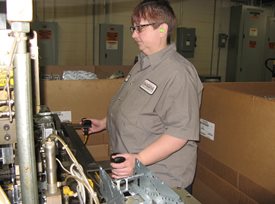Today, Mary Barra makes history as the first female to lead an automaker as General Motors Company’s CEO. Barra has been with the company for 33 years and started as just an intern. In the Barra makes history as GMs new chief published today in The Detroit News, it shows Barras career growth throughout the company, She has worked in numerous areas of the company, starting her career as an intern at 18 on the factory floor and worked her way up through roles in engineering. She served as a plant manager and head of human resources. Akerson in 2011 elevated her status in the industry when he put her in charge of GM product development. She added GMs global purchasing and supply chain responsibilities in August 2013. Mary Barra is a great example to young kids and adults who are still unaware of the true potential a career in the manufacturing/automotive industry can provide. As someone who started as an intern, Barra grew throughout the company and is now the CEO! As a mark in history today, now is a perfect time to reflect on women and their roles in the manufacturing industry. The manufacturing job market appears to be growing, and although slowly, this still creates hope for an industry that faces a talent shortage in finding qualified workers for positions. While this job increase is great news for the industry, companies are finding that men have gained the majority of these positions and women have actually lost them. According to the Joint Economic Committee of the U.S. Congress in the recently published article, Women Not Part of US Manufacturing Turnaround as Men Gain 554,000 jobs In Last Three Years, But Women lose 11,000;the U.S. manufacturing industry has added more than 554,000 jobs to the workforce since February 2010. The article also states that while men gained 565,000 jobs in the industry, women lost 11,000 jobs. In which, according to the Economic Committees Manufacturing Jobs for the Future Report, has lowered female representation in the manufacturing industry to 27 percent, the lowest its been since 1971. So why are women underrepresented in the manufacturing industry? According to the article found in the International Business Times, women are still of the opinion that the manufacturing industry is primarily a male-dominated one and that entry for them is limited because of the physicalities involved. In another related article, Gender Gap Widens in Manufacturing, Stacey DelVecchio, president of the Society of Women Engineers, said girls and young women often aspire to a career that involves working in teams and helping people. DelVecchio said many don’t realize they can do those things as engineers. Allison Grealis, the director of Women in Manufacturing, also provides insight in the article stating The perception is that its still dirty and dark and dangerous [to work in the manufacturing industry] a misguided perception of modern manufacturing working environments. President and CEO, Jeff Clark, of Waukesha® Metal Products brings light to these perceptions of dirty, dark and dangerous with the point that manufacturing today is very technical and requires a variety of skilled talent to meet production requirements; talent that actually requires minimal physical labor. However, it seems as though many Americans dont know about these specialized technical opportunities available in the industry; opportunities that could also provide better pay and benefits. In the Gender Gap Widens in Manufacturing article it mentions that manufacturing jobs tend to pay better than the retail and food-service work done by many women. A Commerce Department study last year found that pay and benefits in U.S. manufacturing averaged 17% higher than nonmanufacturing jobs. This is a percentage that everyone should become aware of. At Waukesha® Metal Products (WMP), we set out to promote the true potential manufacturing jobs can provide through sponsorships and partnerships with local colleges, schools and organizations. Providing internships and apprenticeship programs to students and young adults, WMP teaches and shows them the technical skilled jobs available. Also, as a proud supporter of the Women in Manufacturing organization, WMP recognizes the contribution of women who have chosen a career in the manufacturing industry, and the importance of their continuous engagement, on-going support, and talent development. Below are just a few of WMP women representatives and what they find beneficial about working in the manufacturing industry: Sheryl Welzien Cost Estimating Coordinator I feel that women are adaptable to changes and not credited enough. Working with the team of engineers, press operators, sales associates, etc., gives such a sense of group achievements and is very rewarding seeing a finished product that you helped start. I enjoy the challenges and continuous learning that comes with the ever changing manufacturing field. Damaris Merced Operator Being able to work in a team environment is what I enjoy most about working in the manufacturing industry. You never have to solve a problem on your own. Working together to create solutions and build a final product is a rewarding experience. Cindy Bennett Operator In the manufacturing business there is an opportunity to learn new things all the time. Whether it is a material handler or a press operator, there is always room for advancement in these positions. I also have the best Supervisor! Emily Kamke Operator The best part about working in manufacturing is working with your hands and being able to create nothing, into something.”

